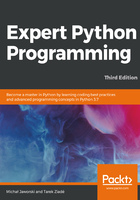
MicroPython
MicroPython is one of the youngest alternative implementations on that list, as its first official version was released on May 3, 2014. It is also one of the most interesting implementations. MicroPython is a Python interpreter that was optimized for use on microcontrollers and in very constrained environments. Its small size and multiple optimizations allow it to run in just 256 kilobytes of code space and with just 16 kilobytes of RAM.
The main reference devices that you can test this interpreter on are BBC's micro:bit devices and pyboards, which are simple-to-use microcontroller development boards, that are targeted at teaching programming and electronics.
MicroPython is written in C99 (it's C language standard) and can be built for many hardware architectures, including x86, x86-64, ARM, ARM Thumb, and Xtensa. It is based on Python 3, but due to many syntax differences, it's impossible to say that it is fully compatible with any Python 3.x release. It is certainly a dialect of Python 3, with print() functions, async/await keywords, and many other Python 3 features, but you can't expect that your favorite Python 3 libraries will work properly under that interpreter out of the box.
You can learn more about MicroPython from its official project page at https://micropython.org.